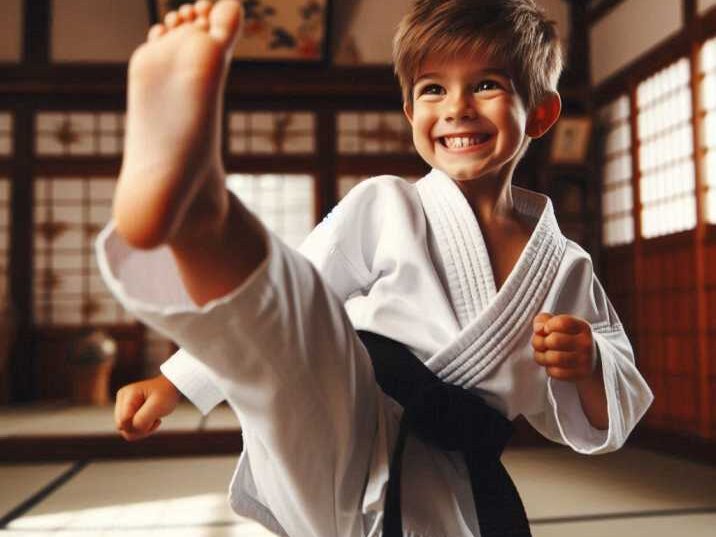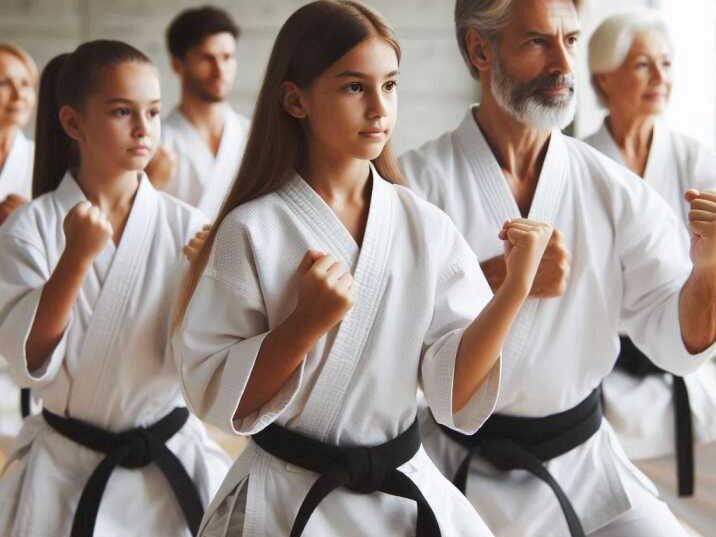Introduction
Table of Contents
Karate is a popular martial art that originated in Japan, but today, it’s practised worldwide. This traditional martial art focuses on self-defence, discipline, and respect. Many kids and adults take up karate training not just for its physical benefits but also for its mental and emotional growth. Whether you’re looking to improve your health or boost your focus, karate offers plenty of advantages. In this article, we’ll explore the many benefits of karate, especially for students in the United States. We’ll disintegration how karate helps your body, mind, and behavior, and why it’s a great sport to practice!

Physical Benefits of Karate
Karate is more than just kicking and punching—it’s a full-body workout that offers physical fitness benefits.
1. Improved Strength and Flexibility
Karate training requires constant movement and body control. The punches, kicks, and stances help you build muscle strength and improve flexibility. As you progress through the levels, your body will become stronger, and your muscles will be more toned. Flexibility is essential in karate, as many movements involve dynamic stretching.
2. Better Cardiovascular Health
Like other physical activities, karate training helps keep your heart healthy. Regular practice can boost your cardiovascular system, reducing the risk of heart disease. Kids and adults who practice karate can increase their stamina, allowing them to perform better in other sports or daily activities.
3. Enhanced Coordination and Balance
Karate involves precise movements that require focus and control. This helps improve your coordination and balance, it is simpler to do tasks requiring fine motor abilities. Learning how to balance on one leg, execute a punch, or kick properly can translate into better body control in general.
4. Weight Management
Karate can also be a fun way to maintain or lose weight. With regular practice, you burn calories and develop muscle, helping to manage a healthy body weight. Unlike some sports, karate works your entire body, making it a fantastic way to keep in shape.
Mental and Emotional Benefits of Karate
Karate not only strengthens the body but also boosts mental and emotional health.
1. Improved Focus and Concentration
Karate training requires concentration and discipline. Whether learning new forms or mastering techniques, students need to stay focused. This improved focus can also translate into better performance in school or other activities.
2. Self-Confidence and Self-Esteem
One of the key benefits of karate is the boost in self-confidence. As you gain knowledge become proficient in different techniques and earn higher belts, You feel more successful. This sense of achievement helps improve self-esteem, making you feel pleased with your development.
3. Stress Relief
Karate is an excellent way to reduce stress. Physical activity naturally helps reduce tension, and practising controlled movements and breathing in karate provides a sense of calm. The mental clarity developed during Additionally, practice can help you manage stress in your day-to-day existence.
4. Discipline and Respect
Karate promotes an awareness of respect for others and teaches students the importance of self-discipline. Through regular practice, students learn to follow instructions, control their emotions, and show respect to their instructors and peers. This discipline can be applied to other aspects of life, such as schoolwork or home responsibilities.
Social Benefits of Karate
1. Teamwork and Social Skills
Although karate is often considered an individual sport, many aspects of training involve working with partners. This helps students develop their teamwork skills, which are important in many areas of life. Practising with others also allows students to form friendships and feel part of a community.
2. Goal Setting and Achievement
Karate encourages students to set goals and work toward them. Each belt level represents a new goal, and the process of advancing and moving from one level to the next teaches persistence. Achieving goals in karate builds confidence and shows students the value of hard work and dedication.

How Karate Helps in School and Everyday Life
Karate is a great way to stay active, but it can also help students excel in school and other areas of life.
1. Better Focus in School
Because karate training emphasizes concentration and discipline, students who practice karate often find it easier to focus in school. The mental discipline developed in karate can lead to better grades and enhanced performance in other activities.
2. Time Management
Balancing karate classes with school and homework helps students develop time management skills. Karate requires a commitment to practice, and managing this along with other responsibilities can teach students how to organize their time effectively.
Table: Benefits of Karate
| Category | Benefits |
|---|---|
| Physical Benefits | Strength, flexibility, cardiovascular health, coordination, balance, weight management |
| Mental & Emotional Benefits | Focus, self-confidence, stress relief, discipline, respect |
| Social Benefits | Teamwork, goal setting, achievement, social skills |
| School & Life Benefits | Improved focus in school, time management |
Conclusion
Karate is much more than just a sport; it’s a way to develop physical strength, mental focus, and emotional well-being. Whether You’re searching to improve your fitness, enhance your self-discipline, or find a positive outlet for stress, karate offers several advantages. For students in the United States, karate can be an incredible journey of personal growth. It provides opportunities to develop lifelong skills like focus, respect, and perseverance. Whether you’re young or old, karate is a great way to stay healthy and happy!
Frequently Asked Questions (FAQs)
- Is karate good for kids?
Yes, karate helps kids improve focus, discipline, and fitness while boosting self-confidence. - How often should you practice karate?
For beginners, practising karate 2-3 times per week is ideal for steady progress. - Can karate help with weight loss?
Yes, karate is a great way to burn calories and stay fit, making it useful for weight management. - Does karate improve mental health?
Karate can improve mental health by reducing stress, building self-confidence, and teaching discipline. - What age is best to start karate?
Kids as young as 5 years old can start practising karate, though it’s beneficial for all ages.


